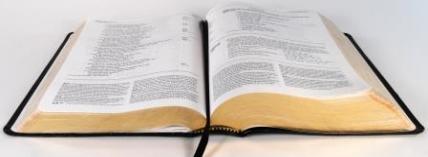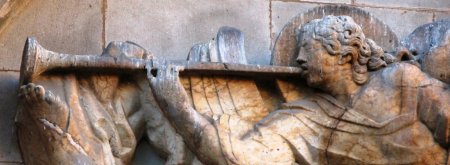What is the Bible?
This is a brief introduction to the Bible – what it is, how it has been put together and what it can mean for people today. Many questions deserve much more space to deal with adequately, but it is hoped that the following may help those who are starting to think about the Bible to get to grips with some of the initial issues and questions they may have. Suggestions are given for resources to dig deeper into some of these areas.
The Hebrew Scriptures
Many religions have a book or books which are considered holy or authoritative. They are often called 'Scripture', which simply means something that is written, but is usually used of sacred writings. Jews often divide their Scriptures into three parts: the Law, the Prophets and the Writings. These Scriptures describe God's active involvement in the lives of individuals as well as in world history. They relate how mankind's relationship with God has been broken and how God has started to restore this through a 'covenant' (which means a binding agreement) with Israel, which would one day extend to the whole world. The Hebrew Scriptures also contain prophecies of a coming Anointed One ('Messiah' in Hebrew and 'Christ' in Greek).
The Christian Scriptures
Christians believe that Jesus of Nazareth was the Messiah prophesied in the Hebrew Scriptures. Hence he is often described by his name and title: Jesus Christ. Christians believe that Jesus came to fulfil the Hebrew Scriptures and to introduce a 'new covenant' which would include all people in a new relationship with God. Various accounts of the life of Jesus, and the activities of the early church were written by some of the very first Christians and quickly came to be seen as holy Scripture by Christians, ranking alongside the Hebrew Scriptures.
A rather archaic word for covenant is 'Testament', which led to the Hebrew Scriptures being called the 'Old Testament' in contrast to the 'New Testament' of the Christian Scriptures, with both together forming the Christian Bible. Most Christians see the Bible as being authoritative for what they are to believe and how they are to live.
What's in the Bible
The Bible is in a sense a single book, for the word 'Bible' comes from the Greek and Latin words for book or books. But within the set of covers that we call our Bible, there are collected together 66 individual books: 39 books in the Old Testament and 27 books in the New Testament. The Old Testament is written mostly in Hebrew, the language of the Jewish people (with a few parts in Aramaic). The New Testament is written entirely in Greek, the common language of the time.
For ease of reference to a particular passage, each of these books has a name or title and is now broken down into chapters and each chapter further divided into verses. So John 3:16, for example, refers to verse 16 of chapter 3 of the Gospel of John. Most Bibles have a Contents page at the beginning (where else?) that is really helpful to locate the individual books that you're not familiar with. The chapters and verses in each book did not exist in the original writings, but were only added in much later. Sometimes the points at which the chapters and verses divide the text are not very helpful. The headings that are found in some Bibles were also added by translators and were not part of the original text.
The Old Testament
The 39 Old Testament books were written over a long period of time, perhaps as much as 1000 years, from about 1500 BC to the middle of the fifth century BC. The books include historical accounts, lists of laws, poetry, songs, prophecy and other types of writing. These accounts were not collected together merely because they were thought to be of historical interest, but because they were believed to show how God was at work in and through his people Israel.
The New Testament
The 27 New Testament books were written over a period of about 50 years. The exact dates for all of them are not known, but the earliest probably dates from some time in the 40s AD. Four books are effectively biographies of Jesus – called Gospels. The author of one of the Gospels, Luke, also wrote an account of the early church and its preaching, called the Acts of the Apostles. One book, called Revelation, is a highly symbolic account of the end of the world. The rest of the books are letters written to various Christian churches with encouragement, criticism and advice, many being written by Paul, who was one of the most important early Christian missionaries.
Who wrote the Bible?
On a human level, many different authors wrote or contributed to the books in the Bible. Many of the books do not explicitly name their author, although in some cases it is clear. In many other cases, the author is unknown or is known only from sources outside the Bible. Some of the books are edited works, collecting together or ordering older material, such as the Psalms which are attributed to a number of different authors, including King David.
Christians came to recognise the books that now form the New Testament as authoritative
However, Christians would argue that this is not the whole story. The Bible itself assumes that God chooses to reveal himself to us and to involve himself in our individual lives and wider histories. The Bible also refers to itself in various places as inspired by God, or containing the words of God. While this does not prove that God is behind it, if God does exist, then it is not unreasonable to think that he would ensure that there was a reliable account for future generations of his revelation to specific individuals and a record of what he has done.
With the Old Testament, Jews began to realise that certain books were authoritative, seeing these as inspired by God. In the same way, Christians came to recognise the books that now form the New Testament as equally authoritative. This was more a realisation that these books were, in some way, special and different, rather than a specific decision as to which books to adopt as Scripture. Hence most Christians recognise the Bible as actually written down by human beings, using their own knowledge, language and individual style, but equally inspired by God, and hence the Bible is reliable in what it teaches, both historically and spiritually.
However, although many people have started to read the Bible simply as a fascinating account of ancient history or as the spiritual development of individuals or even as a body of literature, they have also found that it speaks reality and wisdom, hope and comfort, into their lives. So even if you see the Bible as a purely human product, that is no reason not to read it!
Where are the Original Documents?
We don’t have them! But they were copied – and copies made of those copies and so on until we have the documents that do still exist. The originals wore out or were lost, but the various copies persisted. This raises a lot of questions and there is much that could be discussed on this point. For example, whenever a copy of a document is made by hand (and that was the only way at the time), there is the possibility of errors creeping into the resulting text. Most of these are irrelevant to the meaning, but the issue needs to be considered. A whole area of study called 'Textual Criticism' attempts to study the different texts that remain and compare and contrast the differences to work out the most likely original. But in the vast majority of cases, we are not talking about huge differences that dramatically affect the overall meaning.
In the New Testament, about 80% of the differences between different manuscripts are found to be in spelling (remember that even during William Shakespeare's lifetime, his name was spelt in many different ways – even sometimes in the same document), while others use synonyms or give changes in word order (which in Greek makes less difference to meaning than in English). Most of these, in fact, make no difference to the resulting translation into English or other languages. Very few variations between documents affect the actual meaning or make any significant difference to what Christians believe.
the Gospels were written very early in history, at a time when the original eyewitnesses could testify to what they had seen
As one example of the ability of those copying the Old Testament documents, we can look at the book of the prophet Isaiah. An almost complete copy was found in 1947 in the Dead Sea Scrolls, dating back to the first century BC. When compared to the earliest copy that was previously available, dating from a thousand years or so later, the translators of the Revised Standard Version of the Bible found it necessary to make only three changes to their updated translation. These changes were equivalent to the difference between spelling Saviour as Savior (British and American spellings).[1]
The original New Testament documents are also lost, but the copies we do have are very close to the date of writing – perhaps 50 to 100 years difference. Compared to most other works of ancient history, the validity of which are rarely questioned, this gap is minute. The works of Julius Caesar, for example, written in the first century BC, only survive in less than a dozen copies dating from about AD 800 – a gap of some 850 years. By contrast, there are many thousands of New Testament documents in the original Greek (not all of these give the whole of the New Testament, of course), as well as many more in translations into various languages, as well as quotations in other early writers.
J. Warner Wallace examined the Gospels as a detective and atheist and concluded in his book Cold-Case Christianity: "The reasonable inference from the circumstantial evidence is that the Gospels were written very early in history, at a time when the original eyewitnesses ... were still alive and could testify to what they had seen."[2] This conclusion caused him to re-consider the content of the Gospels and of Jesus' teaching more carefully, leading him to become a Christian. Cold-Case Christianity is a great book for anyone wanting to read more about whether the New Testament Gospels can be trusted as reliable accounts of Jesus' life and death.
For more on the historical reliability of the Bible, see the links in Did the Bible events happen?
What about the Errors and Contradictions?
It's certainly true that there is much in the Bible that can appear to be in error or contradicting other parts of the Bible. Many of these can be explained by a careful reading of what is and is not really being said, and by reading the whole context. Again, Cold-Case Christianity is a really helpful book to read on this, by a detective who is used to hearing apparently contradictory evidence statements from eyewitnesses and coming to see the consistent story that lies behind them all.
To read more on this topic, see the bethinking article: Isn't the Bible Full of Errors?
Why do Christians Treat the Bible as Special?
The consistent witness of Christians over the year is that reading the Bible can lead to an encounter with the living God and the transformation of your life. In the Bible, God has revealed who he is and how we can come to know him. The whole of the Bible is a single account of God’s creation of the world and human beings, the way that we have spoiled that world and our relationship with God, and how God has been working to restore that relationship – it is the record of God working for our salvation.
reading the Bible can lead to an encounter with God
In other words, the whole Bible is about God, but at its very centre is Jesus Christ. The whole of the Old Testament looks forward to and points towards him while the whole of the New Testament flows from him. It is through the life, death and resurrection of Jesus Christ that we can meet God in a new way and have our lives transformed by his forgiveness, love and peace.
We need to see the big picture of God's plan, the whole of the Biblical story, to see how all the pieces of life, as well as all the parts of the Bible, finally fit together. Using the analogy of trying to complete a jigsaw puzzle without the picture on the box, Mike Cain puts it like this:
The Christian claim is that God is the one person big enough to see everything that is going on, and that in the Bible he has given us the picture on the box that really does make sense of all the pieces of our lives.
He continues:
In the end, the picture on the box that tells the story of the universe is a picture of a person – Jesus Christ. He says, "I have come that they may have life, and have it to the full." He is not promising an easy life where all your troubles pack up and go and you pass all your exams and you never get ill. He is claiming to be the one makes sense of life and the one who is the source of life as it is meant to be, because he is the one who has come to restore us to the reason we are on this planet: he has come to give us life in a relationship with the God who made us, life that starts now and lasts forever.
For further reading on this, see: Mike Cain's Have You Got the Whole Story?
How Can I Start to Read the Bible?
First of all, it is probably best to get a reasonably up-to-date translation of the Bible, such as the New International Version or English Standard Version. Some of the language in the King James Version, although beautiful, can be difficult to understand. Once you have chosen your Bible, it is probably best not to start at the beginning of the Old Testament and get bogged down in the genealogies and name lists of Numbers and the laws of Leviticus. If, as we have suggested, the centre of the Bible is Jesus Christ, then the best place to start is with one of the Gospels to learn about his life, death and resurrection – you can then move on to other parts.
Read a whole chapter at a time, more if you can, to see the developing account of Jesus' life. Ask what it tells you about God, about Jesus and how this fits in to God's wider plan of salvation. Is there anything that you need to do as a result of reading this passage?
the best place to start is with one of the Gospels
If you are new to reading the Bible, it would be really helpful to read it with a Christian friend, or at least ask them if you can discuss what you've read with them afterwards. If you feel comfortable, pray beforehand that God will speak to you through what you are reading and will help you to understand it. If you don't believe in God, then read it anyway.
The centre of the Bible is God's revelation in Jesus Christ, but the key issue is why Jesus died on the Cross and whether he rose from the dead afterwards. So if you really want to find out why Christians believe what they do and how these events relate to the rest of the Bible and to our lives today, the 'Dig deeper' resources below will help you think more about these specific issues:
Finally, there are parts of the Bible that can be difficult to understand, although other parts are crystal clear. Mark Twain once said (supposedly) "It ain't those parts of the Bible I can't understand that bother me, it's the parts I do understand." Questions are important and it's helpful to dig deeper into the parts of the Bible you find difficult to accept or difficult to understand. But don't let that stop you from hearing the parts that speak clearly to you – and responding to them appropriately.
Dig deeper
For more on The Significance of the Cross.
For more on The resurrection of Jesus.
References
[1] Walter Kaiser The Old Testament Documents: Are They Reliable & Relevant? InterVarsity Press, 2001, p.164.
[2] J. Warner Wallace Cold-Case Christianity Colorado Springs, Co.: David C. Cook, 2013, p.171. See review.
Further resources
The Bible's big picture
Vaughan Roberts God's Big Picture IVP, 2009.
Mike Cain Have You Got the Whole Story?
Reliability of the Bible
Walter Kaiser The Old Testament Documents: Are They Reliable & Relevant? InterVarsity Press, 2001.
J. Warner Wallace Cold-Case Christianity Colorado Springs, Co.: David C. Cook, 2013.
Digging Deeper
If you want much more background about the Old and New Testaments, the following books are recommended:
John Drane Introducing the Old Testament Third Edition. Lion Hudson, 2011
John Drane Introducing the New Testament Third Edition. Lion Hudson, 2010
A good Study Bible will also provide helpful background information on each book, and detailed comments on many verses. Many also contain a number of helpful introductory articles.
Acknowledgment
A few of the ideas in this article have been taken almost verbatim from notes from Wayne Grudem's seminar 'How can the Scriptures change my life?', for which I am very grateful. I am unaware of any online version of this seminar.
© 2013 Chris Knight



